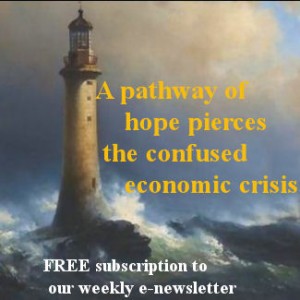For years, the buzz-word in financial markets has been “quantitative easing,” better known as QE. Through the QE cure-all, the Federal Reserve pumped hundreds of billions of dollars into the economy by buying bonds. Those in charge of this money-printing operation have claimed that it stimulated the American economy and kept interest rates low. Others are not so sure of these claims.
Read the popular article: We Must Resist the Temptation to Secession
The operation is definitely controversial. When the Fed finally wound down the QE program last fall, the experiment was declared a success by its fans and a ticking time bomb of unforeseen consequences by its many critics.
However, the story is not over yet.
Other industrial nations are now jumping on the bandwagon and taking over where the Fed left off with massive QE schemes of their own. The Bank of Japan has taken the baton with a bond-buying spree that now funds some 40 percent of all government spending, raising fear of inflation and even hyperinflation.
Not to be outdone, the European Central Bank is now preparing to splurge with rounds of QE bond-buying to the tune of 1 trillion euros (or $1.3 trillion). The move is seen as a measure to fight not inflation but rather deflation that now threatens the European Union.
The logic of the latest QE surge is that more of a good thing is better. If it worked for America, perhaps it will do its magic for the lagging European and Japanese economies.
However, many economists are looking upon quantitative easing with uneasiness. They see chaos in the markets. Pumping money into the system does not necessarily pump it into the right places.
Printing money leads to currency devaluations that in turn lead to currency wars that leave the world dangerously exposed to risk. In addition, the excesses of QE have spilled over to the emerging markets, setting the stage for what is known as “currency mismatches” in the payment of debt, especially dollar-based corporate debt.
William White, a former chief economist to the Bank of International Settlements, believes the world to be “dangerously unanchored.” The noted financial analyst is presently an advisor to German Chancellor Angela Merkel. He predicted with uncanny precision the last crisis and finds the present climate every bit as volatile as it was in 2008.
What is of particular concern is the fact that huge infusions of money are going to bonds, not banks where companies, especially small ones, go for much-needed capital. For a variety of reasons, European banks have tightened credit for small firms. Instead of pumping money into the general economy many fear QE will only pile it up, leading to dangerous asset bubbles, just waiting to burst.
There are fears that the newly printed money will not trickle down into the economy, thus defeating the purpose of the new QE offensive. Europe will be wasting time, money and opportunities in a quick fix that will only make matters worse.
Mr. White believes all these moves are part of a “treacherous dynamic” that leads to ever-increasing global imbalances where normal monetary levers no longer work properly. When these traditional means fail, nations will resort to knee-jerk reactions to defend themselves against crises beyond their control. The rush to QE, he argues, is a great unknown that may well backfire. Even the United States and the United Kingdom who pioneered the scheme may soon pay the price when QE’s side effects kick in.
The final conclusion that can be reached about the QE controversy is that financial magic is exactly that: magic. It is not based on the concrete reality of sound economy, but upon appearances and mirrors that keep the show going. The magician can only pull so many rabbits out of the hat before the trick fails and the show is over.
This desire for financial magic is all part of the frenetic intemperance of the times. There is  a restless and reckless spirit loose inside today’s economies in which everyone demands everything, instantly and effortlessly. The endless search to prolong the magic show reflects a culture of unrestraint that wishes to postpone the day of reckoning.
a restless and reckless spirit loose inside today’s economies in which everyone demands everything, instantly and effortlessly. The endless search to prolong the magic show reflects a culture of unrestraint that wishes to postpone the day of reckoning.
The lessons of history, however, prove the contrary. The day of reckoning always comes. The only way to return to order is to employ the needed common sense and moral restraint that keep economies and cultures in balance. The time has come to return to sound economics. Until then, the quantitative easing will only cause uneasiness.
As first appeared on TheBlaze.com



